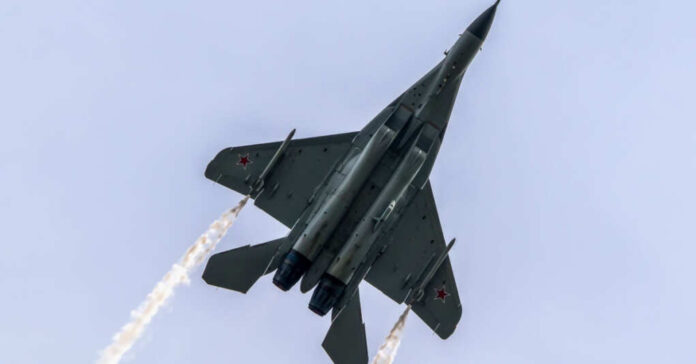
March 14th saw a USAF drone taken out by Russian aircraft as it operated over international waters over the Black Sea. Attacked by two Russian Sukhoi 27 fighter jets, the fighters took unusual, and almost cartoonish actions to take down the unmanned drone. The US European Command (EUCOM) explanation of the MQ-9 “Reaper” going down is a strange one.
“Two Russian Su-27 aircraft conducted an unsafe and unprofessional intercept… one of the Russian Su-27 aircraft struck the propeller of the MQ-9, causing U.S. forces to have to bring the MQ-9 down in international waters.” They also described the incident as “environmentally unsound” as the Russian fighters took turns flying directly in its flight path and dumping fuel all over the drone.
According to USAir Force Gen. James B. Hecker, commander, of US Air Forces Europe and Air Forces Africa, the drone was on “routine operations” and underscored the danger the Russian fighters presented to both sides when they struck the drone’s propellor, forcing a total loss. He stressed that “US and Allied aircraft will continue to operate in international airspace and we call on the Russians to conduct themselves professionally and safely.”
This attack brings back recollections of the Iranian attack on a US drone over international waters in 2019. President Trump planned and then pulled the plug on retaliatory raids on the Iranian targets. When word of the planned attack was leaked, there was an uptick in the risk of lost lives. One the President didn’t think added up. “We were cocked & loaded to retaliate last night… Ten minutes before the strike I stopped it, not proportionate to shooting down an unmanned drone.”
Any kind of delay and inaction can prove to be very costly for commanders on the battlefield in the future. Losing his kind of tech to Iran not only greatly helped their progress in drone production, but it also helped them to level the playing field in their tech going forward. Iran was nearly the last country that needed help playing catchup, but here they are.
Fortunately, US engineers and technologists have far surpassed the drone Iran captured in 2009, and have made that tech obsolete and in quick order. As such, Iran was unable to gain a real strategic advantage in warfare, and Trump’s decision to stay out of retaliatory attacks was one of the best decisions he could have made.
President Biden and his commanders have been largely silent about any retaliatory actions they may need to undertake. Given Russia’s current conflict with the US and largely NATO-backed Ukraine, their attack on a USAF drone almost makes sense. The cartoonish nature of their attack makes it seem as if they don’t know what to do with themselves. The Russian pilots aren’t willing to fire the first shot, but much like in an old “Tom n’ Jerry” cartoon, he knows he can get a quick little teaser attack in there to try and annoy the big cat.
The problem in that scenario is in that cartoon the cat never really wins, and the mouse never really loses either. It’s just a rough and deceptive stalemate with a few black eyes in between. If Russia really wants to attack they’ll need more than this, and the Chinese weather balloon wasn’t going to do it either.
President Biden won’t retaliate either. It makes no sense at this stage to engage with this and possibly risk American lives. Especially as the US military has a horrific time recruiting people to the service. Then again, with the Russians attacking drones over open waters, the forced COVID vaccinations (now recalled), and criminally low pay, who could blame them for staying away?














